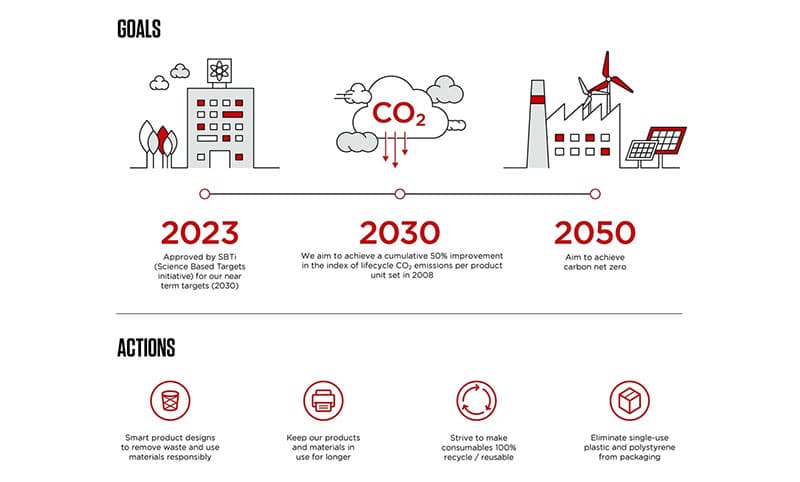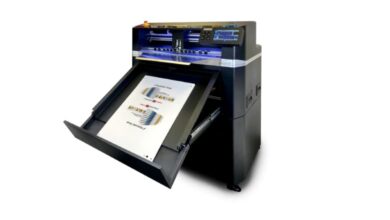Growing a more Resilient and Sustainable Printing Business
Bylined article to be attributed to Shadi Bakhour, B2B Business Unit Director, Canon Middle East

Introduction
drupa 2024 is an important moment for the printing industry this year. Aside from being a hub of exciting innovations, the event gives us an opportunity to pause, reflect and collaborate on a number of issues affecting the industry today. A key highlight at the event will undoubtedly be the importance of sustainability. With many brands now putting more environmentally responsible business models and operational processes in place, a collaborative effort is being made by the industry to reduce its environmental impact – from sustainable ways of printing and the use of devices that contribute to the circular economy, to the adoption of FSC certified, PVC free and recycled substrates.

In this article, Shadi Bakhour, B2B Business Unit Director, Canon Middle East, discusses the changes that he has seen over the last ten years around sustainability in print, key drivers pushing organisational change and what we can expect from 2024 and beyond.
Article
Over the last ten years, we’ve seen a surge in conversations around sustainability and a drive by businesses to grow more responsibly, in a more circular way. Often accompanied by the question of whether this is possible whilst remaining profitable.
Throughout that time, we have seen a rise in options for leasing, reusing, repairing, refurbishing and recycling existing production equipment which has resulted in positive progress towards circularity. Latest technologies have meant improvements to production processes not only in performance criteria such as speed, productivity, and output quality, but also for example, helping to save resources, lower energy consumption and raw material use – helping print businesses to better service their customers, while operating more efficiently. Waste management has also become a hot topic with the industry working hard to recycle or dispose of by-products and printed materials in a more responsible way.
Recent global surveys of consumers and business executives from PwC and Deloitte highlight the same trend: that interest and active participation in sustainability is increasing and, by extension, businesses that are seen to be more sustainable are those that are primed for growth.
This factor is encouraging businesses to change their investments and operations with the same survey by Deloitte among C-suite executives finding that 75 per cent of respondents have increased their investments in sustainability over the past 12 months.
This shift towards organisations intensifying sustainable practices and explicitly stating their sustainability credentials is mirrored in tender requirements across many European regions. Many tenders are now driven by Environmental, Social and Governance (ESG) criteria meaning that an inability to answer questions related to sustainability will almost certainly start to cost businesses opportunities and potentially impact their reputation.
Key sustainability trends driving organisational change
As we look at 2024 and beyond, it’s important to highlight that there is increasing scrutiny around ESG for smaller businesses, as well as for large corporations which often employ dedicated ESG teams and resources.
This is driven by a number of factors, one of the most significant being the introduction of more stringent EU regulations to combat ‘greenwashing’ voted into law earlier this year, after which EU member states will have up to 24 months to comply. Under these regulations, companies will face penalties of at least 4 per cent of their annual revenue for making misleading environmental claims.
And if customer expectations of leading sustainable operations has previously fallen on larger corporations, that is no longer the case. The practical implications for SMEs were summarised by Steve Lister, a sustainability consultant for global brands and retailers, in a recent presentation directed at print service providers (PSPs): “There is an increase in start-ups that already boast sustainable practices as part of their make-up. This means that smaller businesses that may have previously been insulated will start seeing increased pressure to prove their sustainability credentials, from a competitive standpoint as well as from governmental and consumer perspectives.”
The good news for print service providers who understand these requirements and have actioned change, is that they are in the perfect position to offer customers sustainable solutions to their campaign briefs. “The majority of the environmental impact is determined in the early design stage. Choices with lower environmental impact might be alternative print materials that offer greater options for repurposing and recycling at end of life, or options that offer a lower carbon footprint at sourcing and manufacturing stages” concluded Steve.

A catalyst for change
There is no one size fits all solution. Understanding the available technological, operational, and material choices and how they respond to diverse customer needs however, is an investment that print businesses could turn to their commercial advantage, not just from a sales perspective, but as an exercise in futureproofing too.
On one side of the scale, the shift to more sustainable operations and the sharing thereof with customers can be an opportunity for print service providers to develop stronger, more consultative customer relationships and to add value through more considered and creative responses. On the other, it builds business resilience in an ever-changing and challenging commercial landscape, where the trend to sustainable operations can only increase.
Learn more about Canon’s sustainability efforts here and find out more around Canon’s latest sustainability initiatives related to production printing at the Canon stand at drupa 2024 (Hall 8a / B41-1 – B418).





